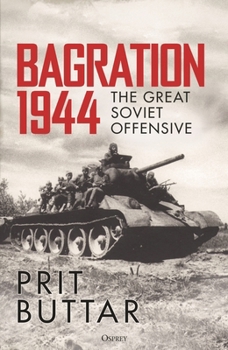Bagration 1944: The Great Soviet Offensive
A fascinating history of the great summer offensive launched by the Red Army in 1944 which turned the tide of the war.
Throughout the war on the Eastern Front, there were two consistent trends. The Red Army battled to learn how to fight and win, while involved in a struggle for its very survival. But by 1944 it had a leadership that was able to wield it with lethal effect and with far more effective equipment than before. By contrast, the Wehrmacht had commenced a slow process of decline after the invasion of the Soviet Union. Hitler became increasingly unwilling to delegate decision-making to commanders in the field, which had been crucial to earlier success. The long years of fighting had also taken a heavy toll. Thousands of irreplaceable junior officers and NCOs were dead, wounded or prisoners. Renowned Eastern Front expert Prit Buttar expertly brings these contrasting fortunes to life, trends which culminated in the huge battles of Bagration. As this masterful study conclusively shows, in 1944 the Red Army finally put together a campaign that utterly destroyed the German Army Group Centre. The Wehrmacht suffered the loss of over 300,000 men killed, wounded or taken prisoner and the Red Army rolled forward across Belarus to the outskirts of Warsaw. The end of the war was still many months away, and the Germans managed to reconstruct their line on the Eastern Front, but final victory for the Soviet Union was now only a matter of time as a direct consequence of Bagration.Format:Hardcover
Language:English
ISBN:1472863518
ISBN13:9781472863515
Release Date:March 2025
Publisher:Osprey Publishing (UK)
Length:480 Pages
Weight:1.00 lbs.
Dimensions:1.0" x 6.0" x 9.2"
Related Subjects
HistoryCustomer Reviews
0 rating





